One of the most buzzed-about exhibitions of the new year is Eye Me, the first major exhibition by South African activist artist Zanele Muholi, opening at the San Francisco Museum of Modern Art (SFMOMA) in January. The exhibition will bring together more than 100 photographs from 2002 to the present, as well as paintings, sculptures, and videos.
Eye Me will be the first major exhibition of Muholi's work on the West Coast, which explores issues of gender identity, representation, and race to make visible the trauma and oppression experienced by black queer communities in post-Apartheid South Africa.
The artist emphasizes the importance of the United Nations Sustainable Development Goals for Reduced Inequalities by basing the dynamic of activism on the dangers and struggles of being gay in South Africa and by highlighting the blackness and gender expression of queer individuals at the centre of her artistic practice. There is no doubt that the sole purpose of Muholi's artistic approaches and artworks is to serve as a living archive to pass on the life journey of the African queer community to future generations.
Zanele Muholi's artistic endeavours since 2002 have focused on activism, with a mission to "to re-write a black queer and trans visual history of South Africa for the world to know of our resistance and existence at the height of hate crimes in SA and beyond," and in her recent works, it is noteworthy that over time, there has been a positive transition from illuminating the challenges faced by queer individuals to embracing their own identities.
Regarding photography, the artist's self-portraits with deep meanings or portraits of LGBTQIA+ individuals bearing traces of their daily lives have long become symbols of resistance and social change. In her black and white portraits, all kinds of materials, from the artist's choice of location to the clothes she wears and even the accessories she uses, act as collaborators supporting activism in the creation process of her works.
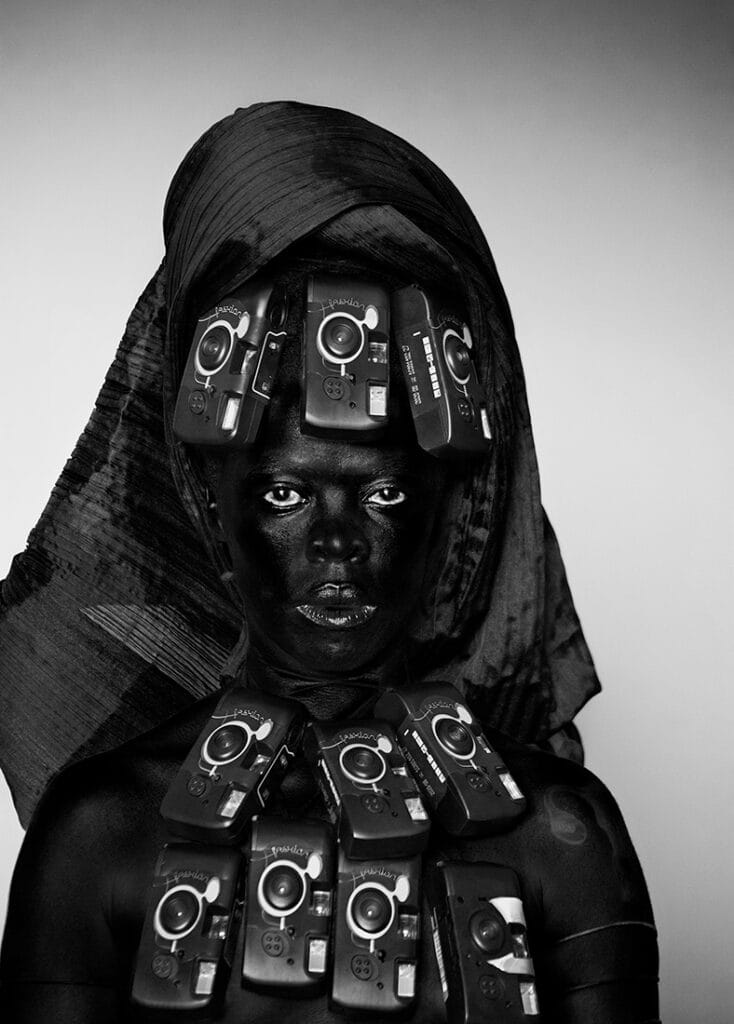
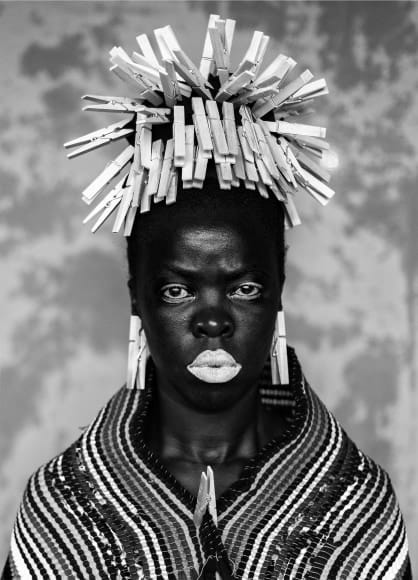
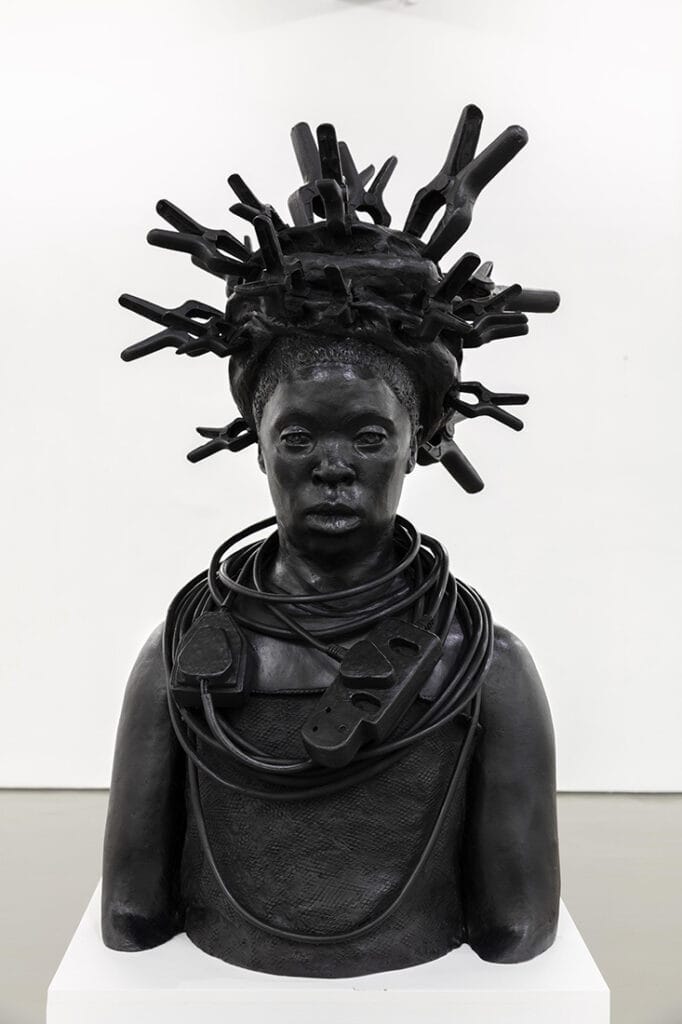
Left to Right: Thathu 1, The Sails, Urban, 2019 by Zanele Muholi. Image courtesy of the artist and SFMOMA. Bester I (Mayotte), 2015 by Zanele Muholi. Image courtesy of the artist and Yancey Richardson. Muholi, 2021, Kansas City, MO by Zanele Muholi. Image courtesy of the artist and SFMOMA.
Therefore, Muholi's referring to the individuals she photographs as participants supports this collaboration and becomes a representation of the expressionism in each of her works. In her photographs, Muholi focuses on the natural state of her participants rather than placing them in specific positions, and by inviting them to speak in her exhibitions, she extends her collaboration with them to strengthen her focus.
Muholi's self-portrait Thathu I, The Sails, Durban, will undoubtedly resonate in her exhibition at SFMOMA. Positioning ten digital cameras as accessories on her body like a crown and necklace, she focuses her piercing gaze on the viewers, showing that ten more eyes -lenses- are watching the viewers beside her, depicting the artist's stance against the world at the peak of hate crimes. The clothespins, cable ties, and electrical cables address concerns about cultural violence and gender identities, while at the same time revealing her critical approach to social brutality, violence, and the exploitative system of slavery. She brings to the fore her critical approach to the history of slavery in each of her self-portraits, in which she turns the camera on herself and questions her racial background and history.
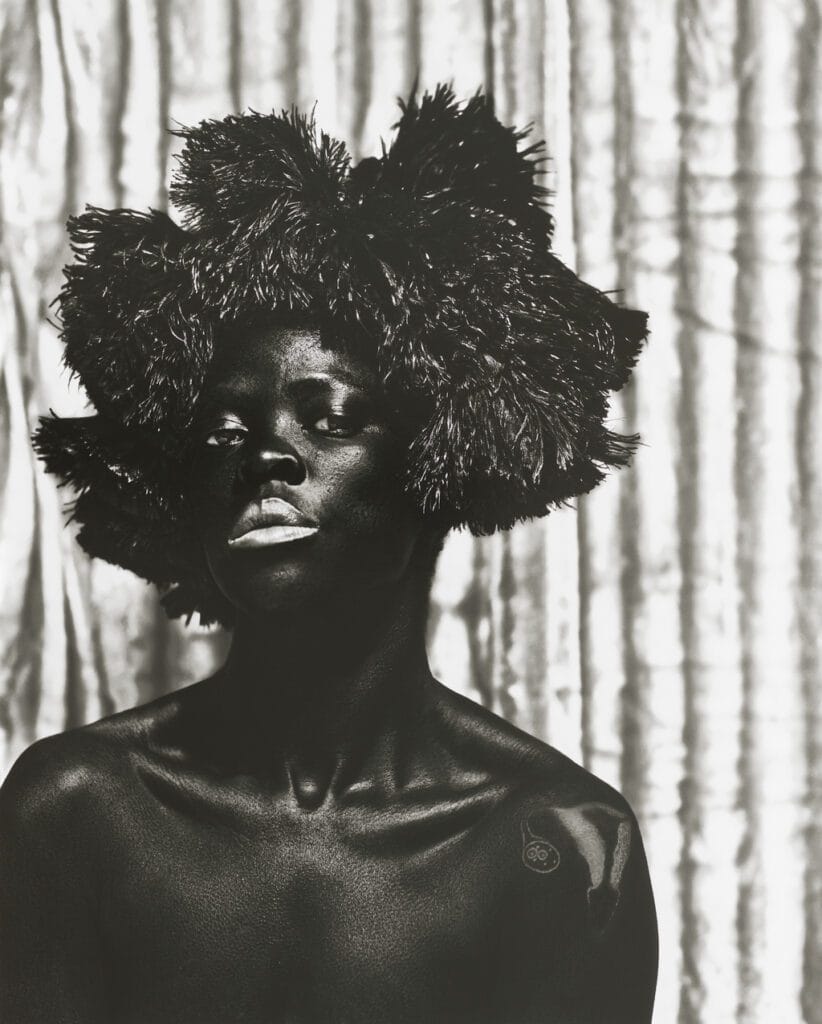
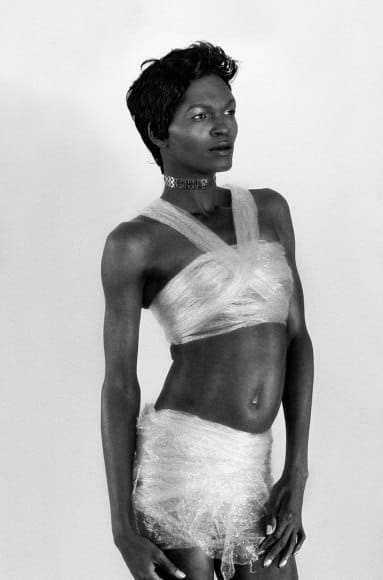
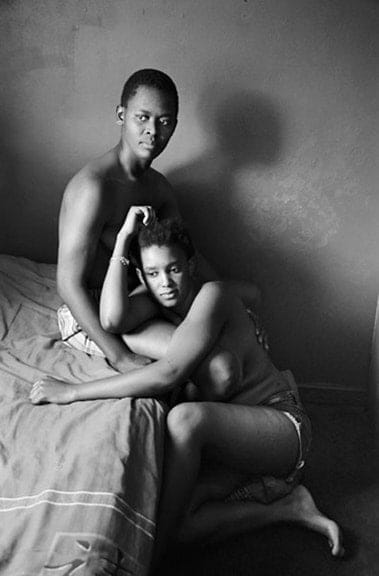
Left to right: Faniswa, Seapoint, Cape Town, 2016 by Zanele Muholi. Image courtesy of the artist and SFMOMA. Yaya Mavundla I, Parktown, 2017 by Zanele Muholi. Image courtesy of the artist and Yancey Richardson. Pearl Hlongwane and Katso Makhafola II Masisulu, Ladies Hostel, Vosloorus, Johannesburg, 2007 by Zanele Muholi. Image courtesy of the artist and Yancey Richardson.
She tries to challenge history by using props that depict the violence inflicted on Black people at the time and her political critique of slavery and inequality during the colonial era and apartheid, a system of political and social discrimination supported by the White minority government. She also tries to show that she protects her language and identity by naming her works from her native language, isiZulu, and encourages Western viewers to try to understand the names and pronounce them. This is her critique of the English names forced on Black people during slavery. All of the accessories that are used in her works act as an element of artistic aesthetics with dramatic and political meanings in her radical self-portraits.
In this respect, whether it is her own body or members of the LGBTQIA+ community in South Africa, whether in her photographs, sculptures or paintings, she draws attention to the traumas experienced by queer individuals, while focusing on their beauty, courage and determination to raise awareness. While documenting the lives of LGBTQIA+ communities, she focuses on race, gender and sexuality in all her works dating back to the early 2000s.
Eye Me exhibition begins with the artist inviting viewers on a fascinating black-and-white journey through Only Half the Picture, her first series of photographs that emerged from her participation in the Women's Empowerment Forum founded in 2002. While some of the photographs in the exhibition point to violence, as they focus on survivors of hate crimes in South Africa, they also focus on the lives and stories of individuals and inspire hope for the future.
Eye Me is not only a collection of paintings and human portraits focusing on the daily lives of queer individuals but also a manifesto of the struggle for existence, self-awareness and freedom of life. SFMOMA will exhibit 36 works from Muholi's photographs of more than 500 portraits from her visual archive of the lives of queer individuals since 2002. Video interviews with the participants in the collective portraits in the exhibition shed light on the stories of queer individuals and serve the meaningful purpose of making their voices heard by the world.
Although South Africa became the first African country to legalize same-sex marriage in 2006, hate crimes and discrimination against queer individuals continue to restrict their freedoms in every field by harshly intervening in their living spaces. Despite this common struggle of the queer movement, the efforts of black lesbians in South Africa to have their voices heard before 1994 show that even today they are the ones who suffer the most from homophobic-motivated violence, as they were excluded from the common movement.
Muholi also strives to raise awareness of LGBTQ+ individuals by emphasizing positive resistance to promote unity in her works. The artist's exhibition at SFMOMA includes works in which she tries to break this negative view towards homosexuals in South Africa and reveals her struggle for awareness.
While the female body is often foregrounded in sexualized popular culture, black female bodies or black lesbians are seen as undesirable in the patriarchal perspective. Muholi, who is involved in an artistic resistance to change this negative approach towards homosexual individuals in Africa, encourages transgender individuals, especially African lesbian women, to establish sincere eye contact with the audience, emphasizes self-awareness and acceptance of existence, and displays a look of determination on this issue.
During the COVID-19 pandemic, Muholi breathed new life into the practice of self-portraiture and included painting and sculpture in this symbolism of resistance. Just as she incorporated the accessories she used in her self-portraits into her paintings and sculptures, creating figures of power that defied history, these new art representations will take their place at SFMOMA as important and impactful works. The exhibition will also feature Difficult Love, a highly thought-provoking documentary film co-directed by Zanela Muholi with Peter Goldsmid, focusing on the lives of Black lesbians in South Africa.
In all of Muholi's works to be presented at SFMOMA, she brings themes such as skin colour, pride, discovery, and acceptance to the forefront, touching the lives of queer individuals and allowing them to tell their own stories. To make the black gay community visible, she allows the audience to question deep-rooted issues such as homophobia, xenophobia, racism, sexism, and transphobia. By paving the way for this activist art for future generations, the artist endows an incredible archive of the devastating effects of gender inequality, homophobia, prejudice and discrimination.
